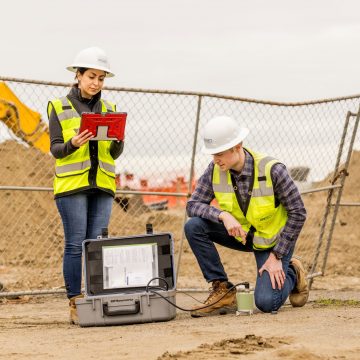Consulting Engineers for Dummies
Consulting Engineers for Dummies
Blog Article
5 Easy Facts About Consulting Engineers Explained
Table of ContentsThe 2-Minute Rule for Consulting EngineersConsulting Engineers for BeginnersWhat Does Consulting Engineers Do?What Does Consulting Engineers Mean?See This Report on Consulting EngineersNot known Factual Statements About Consulting Engineers
To provide the finest experiences, we utilize modern technologies like cookies to store and/or gain access to tool information. Consenting to these innovations will enable us to process information such as surfing behavior or special IDs on this website.They carry out website examinations, collect samples, carry out lab examinations, and analyze data to assess the suitability of the ground for building jobs. Based on their findings, geotechnical engineers offer suggestions for structure style, incline security, maintaining frameworks, and reduction of geotechnical dangers. They team up with other professionals, such as engineers, architectural designers, and building and construction groups, to ensure that geotechnical considerations are integrated right into the overall task style and application.
Getting The Consulting Engineers To Work
They interpret the information to recognize the residential properties and actions of the soil and rock, including their toughness, permeability, compaction characteristics, and groundwater problems. Geotechnical Analysis and Layout: Geotechnical engineers analyze the information gathered throughout site examinations to examine the stability and viability of the site for building and construction jobs. They perform geotechnical computations and modeling to evaluate aspects such as birthing ability, negotiation, slope security, lateral planet stress, and groundwater flow.
Structure Design: Geotechnical engineers play a vital duty in developing structures that can safely support the desired framework. They evaluate the dirt conditions and tons needs to identify the suitable structure type, such as shallow structures (e.g., grounds), deep foundations (e.g., piles), or specialized strategies like dirt improvement. They take into consideration elements such as negotiation limits, bearing ability, and soil-structure communication to develop ideal structure layouts.
Here are some types of geotechnical designers: Structure Designer: Structure engineers specialize in developing and examining structures for structures (Consulting Engineers). They evaluate the soil conditions, tons demands, and site features to establish the most proper structure type and design, such as shallow foundations, deep foundations, or specialized methods like heap foundations
More About Consulting Engineers
They perform area screening, collect samples, and analyze the collected information to identify the soil homes, geologic formations, and groundwater conditions at a website. Geotechnical Instrumentation Designer: Geotechnical instrumentation engineers focus on tracking and measuring the actions of dirt, rock, and structures. They install and maintain instrumentation systems that monitor variables such as dirt settlement, groundwater degrees, slope activities, and architectural variations to evaluate efficiency and supply very early warnings of potential problems.
In the office environment, geotechnical designers use specialized software devices to execute estimations, produce designs, and assess data. They prepare records, testimonial project requirements, interact with customers and team members, and coordinate task tasks. The workplace setting offers a conducive environment for research study, evaluation, and partnership with various other specialists involved in the task.
Some Known Details About Consulting Engineers
They regularly check out task sites to conduct site investigations, analyze geotechnical problems, and gather data for analysis. These visits include taking a trip to various areas, sometimes in remote or challenging surfaces. Geotechnical designers might execute dirt tasting, conduct examinations, and screen building and construction tasks to ensure that the geotechnical aspects of the project are being carried out appropriately.

Prior to any structure is built, engineers need first to examine it. This is to see if the ground appropriates and tough enough to safely begin building and construction of a building. The procedure is done with geotechnical examination. It offers details on the physical residential or commercial properties of soil earthworks for proposed structures and for the fixing of distress to earthworks that are triggered by subsurface problems.
Examine This Report about Consulting Engineers
This information can be made use of for a whole lot much more. Maintain reading as we note down the numerous purposes of geotechnical examinations and why it is necessary in geotechnical engineering. Geotechnical website investigation is crucial in the construction process due to the fact that it aims to recognize and provide details on the site's subsurface problems.

The important steps in bring them out continue to be the very same. They are: This is where geotechnical design occurs to recognize the area's geology. It can be done with geologic mapping, photogrammetry, or geophysical methods. All in all, it is find out here now done to examine the physical problems of the soil.
Little Known Questions About Consulting Engineers.
This is usually where they use borings or explorations to take out soil examples. Other than this, the designers will likewise visually evaluate the soil for rock and water.
These are generally done through geophysical examinations and scientific studies, which are quite helpful for uncovering below ground abnormalities or utilities. When engineers have actually conducted their examination, they will certainly require to create suggested remedies. They will then give companies with just how to approach the website's building and construction. Understanding subsurface problems prior to the building of sites the website is necessary to make sure that the framework is built securely and can be sufficiently sustained.
Report this page